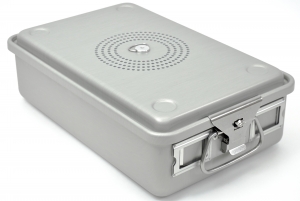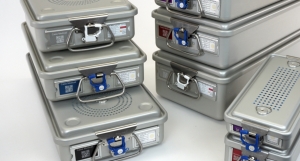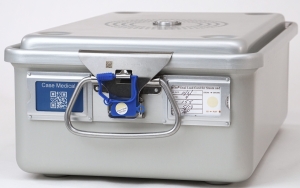Eyes wide open
Management by walking around is a strategy where managers leave their desks and walk around the workplace to understand employees and their ongoing work better. You can learn a lot by just walking around your facility and paying attention to your environment. As a matter of fact, that’s often how we find ways to help you, our customers and develop products to meet your needs. One of our sales team was recounting that on a recent visit to an SPD he noticed the sad state of many of the department’s rigid containers. The containers were covered with tape and permanent marker scribbles. Needless to say, Case Solutions Ink & Adhesive Remover was the right product for the job. The broader point is that sometimes we become so used to our surroundings that we don’t see the obvious anymore. This is where we can help.
What weighs more? It depends on how you perceive it...
What weighs more? A pound of feathers or a pound of bricks? Answer: Neither they both weigh a pound. Okay, here’s another, what weighs more a gallon of water or a gallon of butane? Read on for the answer...
Reusable Containers for the Long Haul
Rigid reusable container systems are designed for a long useful life. That is why they are a good investment. We know of containers that have been in continuous use for more than 15 years, but nothing lasts forever. With common sense care and handling you too can get maximum longevity from your containers.
How to Identify the Right Container System for your SPD
A quick look into sterile storage can be a real eye opener. Do you see shelf after shelf with instrument sets and medical devices all in blue wrap? Do you have a container system that is turning colors, easily dents, and is often out for repair? Choosing a rigid re-usable container system can pay for itself, if it is durable, repair free, sustainable by design, and universally compatible with devices and sterilization modalities.
U.S. Sets Global Record with Over 1 Million Reported Virus Cases in a Day
According to USA Today, “A substantial increase in coronavirus infections was expected when this week's numbers came out, but nothing like this.”
The intensely rapid spread of the omicron variant and a backlog of cases from the New Year's weekend has resulted in U.S. health authorities tallying more than three times as many new cases as in any previous wave of the coronavirus -- over 1 million reported cases on Monday alone. About 1 in every 100 Americans will have been reported as a positive case in just the last week, according to data from Johns Hopkins University.
Christmas, Hanukkah, Kwanzaa, Winter Solstice during a Pandemic
As discussed last week, the healthcare industry contributes to solid waste production, greenhouse gasses, and climate change. While a true statement, the news is that there are also ways that healthcare can reduce the impact it has on the environment, while reducing costs. Rigid reusable sealed sterilization containers are one of the best options for reducing hospital waste. Nevertheless, not all containers are created equal.
READ MORE
The Better Bargain for Loaners and Other Frequently Used Sets
As discussed last week, the healthcare industry contributes to solid waste production, greenhouse gasses, and climate change. While a true statement, the news is that there are also ways that healthcare can reduce the impact it has on the environment, while reducing costs. Rigid reusable sealed sterilization containers are one of the best options for reducing hospital waste. Nevertheless, not all containers are created equal.
READ MORE
Healthcare and Sustainability Go Hand in Hand
Sustainability is a topic that continues to gain attention in light of climate change and as a healthcare goal. Healthcare can both contribute to the problem and can be at the forefront of change. This week’s blog is a preview of our educational program scheduled for this Thursday. In fact if US healthcare were a nation, it would rank 13th in the world for greenhouse gas emissions? Yet many facilities are developing sustainability programs and discovering how even small changes can have big results. If you want to learn more about this critical subject...
READ MORE
Science, Sterile Processing, and the Search for Planet B
Are we alone in the universe?
We may find the answer in the next decade or two relying on clues which science provides to help us find the way. This includes balancing what we understand about our planet and recognizing what we know are the critical elements for life.
Next month, the launch of the Webb telescope might give us the means to discover whether we find another earth out there, a Planet B. The search for Planet B is complicated. Nevertheless we know that even in its most extreme conditions, life is carbon based, liquid water is the solvent for biochemistry, and DNA is the code for genetic information. The building blocks for life, hydrogen, oxygen and carbon are found abundantly in the universe. So what does this have to do with Sterile Processing?
READ MORE














